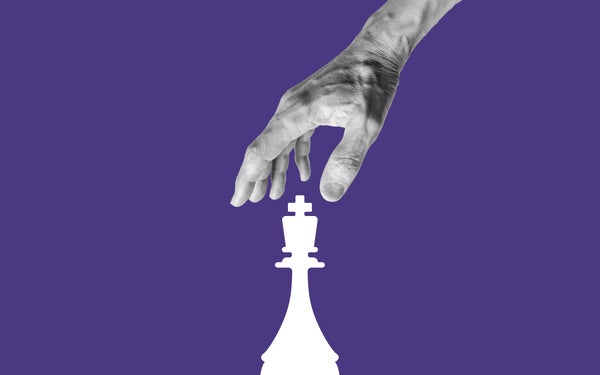How Games Run Everything from Online Dating to Social Media to Stock Markets

How Game Designers Secretly Run Your Life
Games have captivated people since ancient times. Now they run our lives
Boris Zhitkov/Getty Images
In an ancient Hindu hymn, a game of dice was compared to an addictive drug. Three thousand years later, when the world’s first casino emerged in Renaissance Venice, it prompted a near collapse of the ruling class because they bankrupted themselves gambling.
We can learn a lot about ourselves as a species by studying what fascinates us. People have been captivated by games for millennia, and today the gaming market is about as big as all other forms of entertainment combined. Play is often dismissed as trivial, but it is evolutionarily ancient: most mammals and some birds, reptiles, fish and even insects play. It’s been one of the more challenging behaviors for neuroscientists to study because it is so difficult to suppress. If you surgically remove a rat’s entire rindlike cortex—the structure believed to be responsible for higher intelligence—the animal will still play.
[Play science-inspired games, puzzles and quizzes in our new Games section]
On supporting science journalism
If you’re enjoying this article, consider supporting our award-winning journalism by subscribing. By purchasing a subscription you are helping to ensure the future of impactful stories about the discoveries and ideas shaping our world today.
Why is this behavior so deeply ingrained? The brain builds models of the world to anticipate events, but games are all about uncertainty. Unpredictable events are particularly fascinating because their unpredictability means something is missing in the brain’s world model. Uncertainty is like a signpost indicating that there’s more to learn. Children stop playing tic-tac-toe once they realize that, played correctly, it always ends in a draw. Through play, we learn how to handle the unknown.
Many animals play to explore the physics of their environment, and social animals also play to understand one another. By isolating young rats from their peers, researchers have gotten a sense of how play contributes to brain development. As adults, play-deprived rats tend to be more aggressive and less attuned to their peers’ social cues. Play is how we learn to get along with others and discover one another’s boundaries. For instance, while playing, kittens learn to retract their claws and to bite with restraint. How can I grab my friend’s attention without hurting them? How much force should I use when I carry my future offspring by their nape?
Long before neuroscientists studied play’s role in social learning, Plato argued that games were vital because they taught children to follow rules. In the future, as citizens, they’d respect laws. Medieval aristocrats were required to learn chess because it was thought to act like a mirror for one’s character: they’d learn about themselves. Philosophers similarly celebrated the ancient game of Go for honing its players’ insight. Competitive games are ultimately about cooperation. They train us to obey rules and achieve arbitrary goals in a fair and socially sanctioned way. Games are a kind of domestication.
Given play’s role as a powerful socialization tool, it’s perhaps no surprise that games have also served as a medium for moral lessons. An Indian saint reportedly invented Snakes and Ladders to demonstrate how karma works. The ancient board game Senet taught Egyptian players how to navigate the afterlife. The Mansion of Happiness—precursor to today’s Game of Life—taught Victorian children how virtues and vices could buffet their life trajectory. Games force us to think about other people, to consider what they want and how they’ll try to get it. This isn’t the same thing as empathy, but it’s groundwork for it.
Games also revealed profound truths about reality—or so it seemed. As casinos became popular in Renaissance Europe, gamblers who sought an edge studied how dice worked. Their efforts to mathematize gambling led to the birth of probability theory, one of empiricism’s most astonishing early successes. Chance—then thought to reflect the whim of God—could, in fact, be studied and systematized. It operated according to laws. That the very unpredictability of die throws could be formalized was revolutionary.
As a language suited to expressing what one doesn’t know, probability theory helped fuel the scientific revolution. Yet the randomness of dice is an orderly kind of randomness, much less messy than that of real events. Though this may seem like an abstract problem, it’s thought to be partly responsible for the replication crises in science because researchers can mistakenly use statistics that are better suited to game pieces to characterize their experimental results.
Today the business world uses probability theory as its lingua franca, and economic ventures are reframed as bets. The implications of this ramify through today’s stock markets and their myriad financial derivatives. The connection goes even deeper than that. Because games are so good at shaping our behaviors, they’ve been adopted in the design of many of our modern social and economic systems. Now game design dictates what ads we’re served as we scroll through our feeds, how we’re paired on dating apps and how we’re matched with jobs.
Game designer Reiner Knizia argues that the scoring system is an essential aspect in creating a game. It drives how the game is played. By leveraging rewards, designers can control players’ behaviors to make games work as intended. In Monopoly, for instance, a player must act like a cutthroat capitalist to win, regardless of their personal convictions. Games designed by corporations permeate our lives, even as the rules of those games remain mostly hidden to us. That’s why it’s crucial that we understand how these games influence us so that we can sieve out our actual values from those of the designers. Otherwise, the games are playing us.